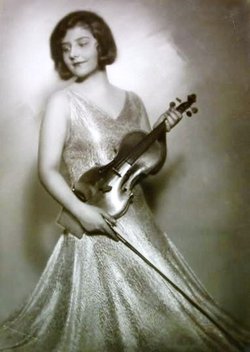History of Feminism
Related: About this forumAlma Rosť 11/03/06 - 4/04/44 Professionalism in the face of horror

Violinist, Conductor. As director of the Women's Orchestra at Auschwitz, the infamous Nazi death camp, she helped save the lives of over 40 mostly Jewish musicians during World War II. Born in Vienna into an assimilated Jewish family (originally named Rosenblum), Rosé was predestined for a musical career. She was the daughter of Arnold Rosé, longtime Concertmaster of the Vienna Philharmonic and State Opera orchestras, and founder of the world famous Rosé String Quartet; her uncle was composer-conductor Gustav Mahler. In 1926 she made her debut as a violinist in Bach's Double Concerto in D minor, accompanied by her father. From 1930 to 1935 she was married to Czech violinist Vasa Prihoda. Although her talents as a performer proved to be modest, Rosé won notoriety as founder of "The Waltzing Girls of Vienna", a female classical pops orchestra which she led as conductor-soloist in concert tours throughout Europe. They disbanded when Nazi Germany annexed Austria in 1938.
Just before the outbreak of World War II Rosé and her father managed to flee to safety in London, but financial difficulties there and the promise of lucrative solo engagements in Holland lured her back to continent. Hitler's invasion of The Netherlands in May 1940 left her trapped. Following tense months of hiding she escaped to France via the underground and was on her way to Switzerland when she was betrayed to the Gestapo and interned at Drancy near Paris. In July 1943 she was deported to the Auschwitz II women's camp at Birkenau. Rosé was originally held in the dreaded Block 10 - the medical experiments unit - but when it was discovered that she was a famous violinist she was made a Kapo and put in charge of the Women's Orchestra. The creation of Maria Mandel, the sadistic Commander of Birkenau, its duties included performing at the main gate for prisoners marching to and from work, giving weekend concerts, and supplying background music for certain SS functions. There are conflicting reports whether or not they actually played while victims were selected and sent to the gas chambers. Although it boasted a few professional musicians (including French singer and pianist Fania Fenelon), the orchestra was mainly a ragtag collection of terrified amateurs. Aware that their survival literally depended on how well they played, Rosé disciplined them into an almost virtuoso-sounding group. She somehow persuaded Mandel that the ensemble was "essential" to the camp and under her leadership it expanded to 45 members. Their living conditions improved considerably - they were exempted from manual labor, given better food rations and even medical treatment (something unheard of for Jewish prisoners). Since eviction from the musicians' block meant certain death, she kept on the less talented as copyists and assistants.
During her 10 months as conductor none of her musicians were gassed or died from other causes, an almost miraculous feat in that hellish environment. Rosé herself was not so lucky. She fell ill after attending a birthday party for another Kapo and died, probably from food poisoning, two days later. She was 37. In a bizarre twist, one of the doctors who treated her was Josef Mengele, the "Angel of Death". The Women's Orchestra continued to receive relatively preferential treatment until September 1944, when they were evacuated to the Bergen-Belsen camp; all but two of Rosé's players lived to see the end of the war. In her autobiographical novel "Sursis pour l'orchestra" (1975), Fania Fenelon depicted Rose as an arrogant, abusive control freak who cozied up to the SS to gain personal privileges. The book was later adapted by Arthur Miller into the Emmy-winning TV movie "Playing For Time" (1980), with Jane Alexander as Rosé. Other Auschwitz survivors contested Fenelon's account, expressing gratitude for Rosé's efforts on their behalf while acknowledging her single-mindedness and ego - and the ethical questions raised by her role in the camp. It was not until the publication of Richard Newman's biography "Alma Rosé: Vienna to Auschwitz" (2000) that further light was shed on the complex story of this enigmatic figure.
http://www.findagrave.com/cgi-bin/fg.cgi?page=gr&GRid=23093150
http://holocaustmusic.ort.org/places/camps/death-camps/birkenau/rosealma/
JustAnotherGen
(31,780 posts)But one my parents let me stay up to watch when it came on television so many years ago. . .
Playing For Time
It's based on Fania Fenelon's play/account of these women.
http://www.imdb.com/title/tt0081344/
KitSileya
(4,035 posts)I read it 25 years ago, and in fact mentioned it in conversation as recently as today. It made an indelible impression on me. Fenelon describes an argument they had in the orchestra barracks about unhappiness that really blew my 15-year old mind.
Some have criticized Rosé for co-operating too much with Maria Mandel, but I think that's hogwash. To retain a dignity and professionalism in that environment was the ultimate f(/& you to the Germans who thought that Jews were lower than animals.
As the granddaughter of a German soldier who served in Norway, I read pretty much all the Nacht und Nebel books, biographies and autobiographies written by survivors from the concentration camp system, as a teenager. I may never have met my grandfather, but I am determined not to forget what my family had a hand in, and to learn the lesson so that it will not be repeated.